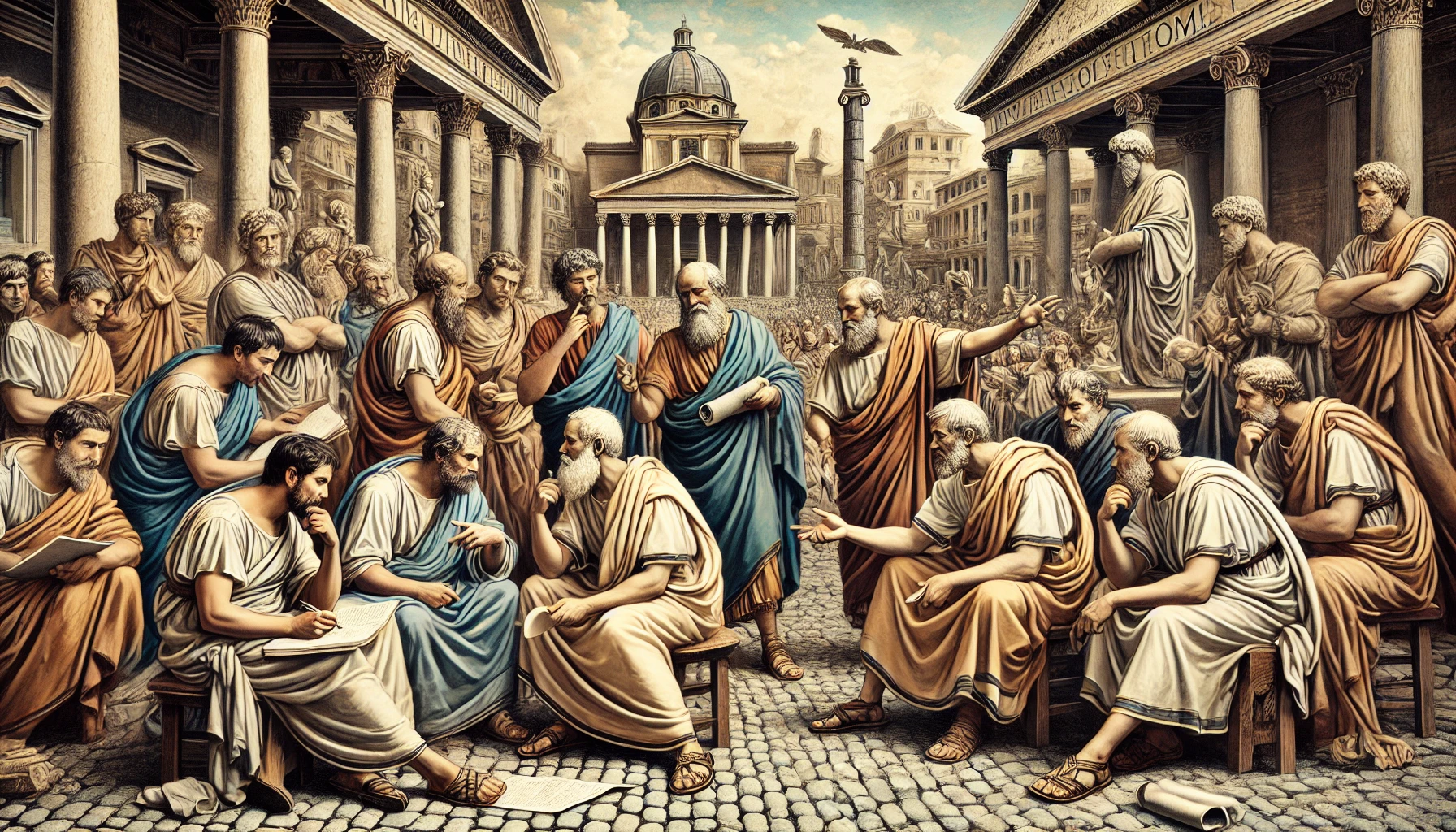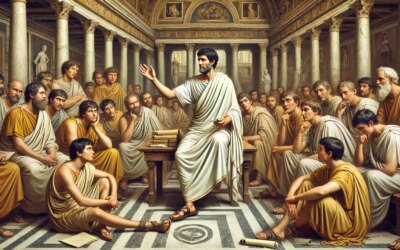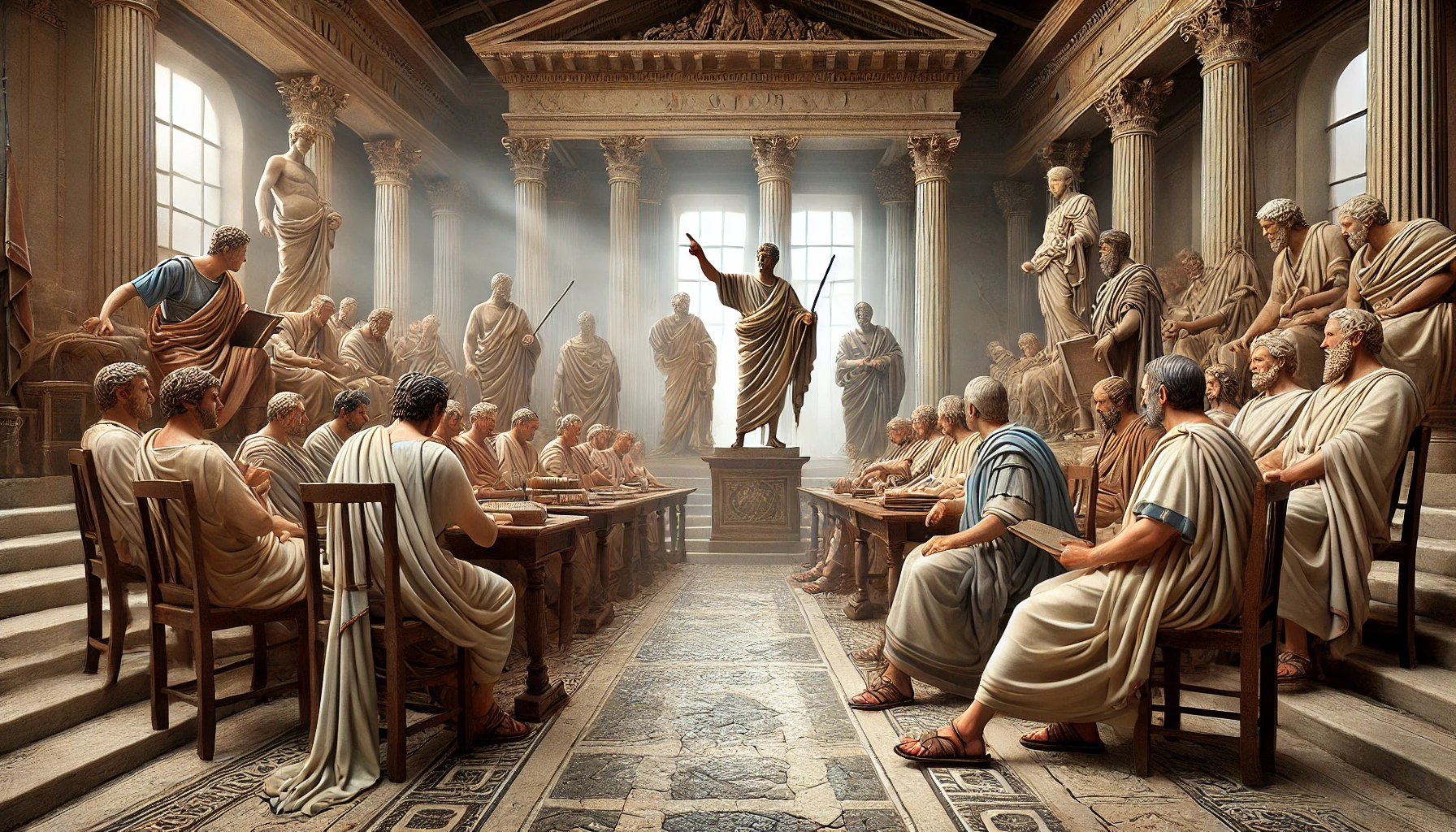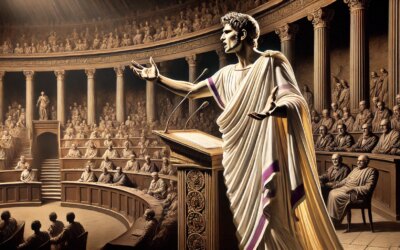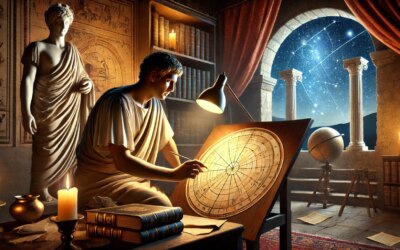The Forum as a School of the Mind
Long before lecture halls and ivory towers, the heart of Roman intellectual life beat in the open-air columns of the Forum Romanum. In the 1st century BCE, this civic space—already renowned as the nucleus of political life—also became a vibrant arena for philosophical debate. Senators, scholars, and citizens gathered amid temples and basilicas not just to argue policy, but to wrestle with questions of virtue, justice, fate, and the human soul.
The Roman Turn to Philosophy
While Rome was a city of action, conquest, and law, its elite were deeply influenced by the Greek philosophical tradition. After the conquest of Greece in the 2nd century BCE, Rome absorbed not just art and architecture, but ideas. By the 1st century BCE, Stoicism, Epicureanism, and Academic Skepticism had taken root in Roman soil. These schools offered frameworks for ethics, governance, and personal conduct—critical tools in a Republic beset by crisis.
The Roman Forum, already a center for rhetoric and political oratory, naturally evolved into a forum of ideas. The same stones that heard the speeches of Cicero and the laws of the Senate also bore witness to arguments about fate, freedom, and virtue.
Cicero: Statesman and Philosopher
No figure better embodies this fusion of philosophy and politics than Marcus Tullius Cicero (106–43 BCE). A renowned orator, statesman, and philosopher, Cicero adapted Greek philosophical thought to Roman realities. His writings—De Officiis, De Republica, De Natura Deorum—brought Stoic and Academic ideas into dialogue with Roman civic life.
Cicero believed that philosophy was not just a theoretical exercise, but a guide for public duty and personal integrity. He argued that justice must be rooted in natural law, that true power comes from virtue, and that the wise man serves the Republic. In the Forum, he debated these ideas not only with fellow philosophers but with political adversaries, bringing reason into the often unruly arena of power.
Schools of Thought and Clash of Ideas
Roman intellectuals of the period often aligned with competing schools:
- Stoics like Cato the Younger prized virtue, self-discipline, and alignment with natural order. For them, the good citizen must be unshaken by fortune or fear.
- Epicureans, though less popular in public life, preached rational pleasure, friendship, and withdrawal from politics as paths to tranquility.
- Academics, inspired by Plato’s Academy, emphasized skeptical inquiry and the limits of certain knowledge—an approach Cicero often favored.
These philosophies influenced Roman law, military ethics, and personal comportment. The Stoic idea of duty guided generals and jurists. The Epicurean emphasis on peace informed domestic policy. Even emperors later styled themselves as philosophers in armor.
The Forum as a Living Symposium
Unlike modern academic spaces, the Roman Forum was noisy, chaotic, and public. Debates unfolded in porticoes, courtyards, and even at temples like the Temple of Concord. Philosophers debated beside merchants, magistrates, and plebeians. Philosophy in Rome was not hidden in books—it was spoken, contested, and lived.
Students flocked to hear teachers like Crassus, Scaevola, or Lucretius read and reason. Arguments often spilled into politics. Ethical debates over justice or power influenced decisions in trials and Senate votes. Philosophy was a civic force, shaping the moral vocabulary of the Republic.
The Decline of Dialogue
As the Republic gave way to imperial autocracy, the open debate of the Forum diminished. Augustus and his successors centralized authority, and free philosophical inquiry became less public and more constrained. Some schools, like the Epicureans, retreated into private circles. Others, like the Stoics, became tools of imperial virtue—or targets of suspicion, as with the later execution of Seneca under Nero.
Still, the memory of 1st century BCE philosophical life endured. The debates of that era became models for later thinkers—from early Church fathers to Enlightenment philosophers. The Roman Forum, though now quiet and ruined, once rang with the voices of those who believed that truth must be spoken aloud, in the heart of the city.
Legacy in Thought and Stone
Today, the philosophical spirit of the Roman Forum survives in the questions we still ask about law, duty, freedom, and the good life. To walk among its columns is to tread in the footsteps of those who argued not just about what was expedient, but what was right. In an age of civil war and tyranny, they turned to reason—and for a brief moment, reason answered back.

